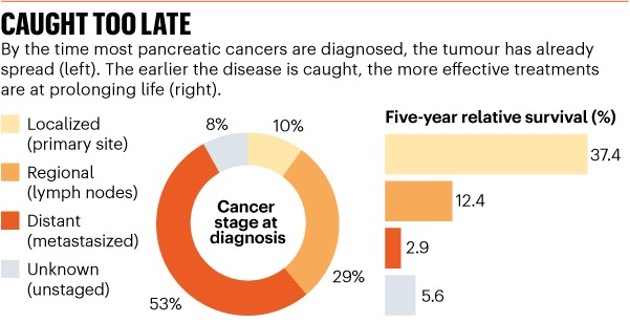Early Detection Initiative

Our Early Detection Initiative is undertaken in collaboration with the research community to improve early diagnosis of pancreatic cancer. Our Initiative provides increased focus and funding for projects that will allow the earlier detection of pancreatic cancer.
“Currently, there is no established way to test or find pancreatic cancer early. Only around 10% of pancreatic cancers are diagnosed before they spread. However, if detected early, long-term (5 years +) survival rates are 10 times higher. We believe that early diagnosis offers the greatest hope to triple survival rates by 2030,”
~ Michelle Stewart, CEO PanKind
Early Detection Research
Since our inception, PanKind have been committed to funding impactful research that furthers the understanding of pancreatic cancer, including projects to detect the cancer earlier and provide better treatment options to improve survival outcomes.
What is early detection?
“Early diagnosis of cancer focuses on detecting symptomatic patients as early as possible, so they have the best chance for successful treatment. When cancer care is delayed or inaccessible there is a lower chance of survival, greater problems associated with treatment and higher costs of care.”(1)
Why is early detection important?
People who have pancreatic cancer diagnosed in the early stages of disease have better outcomes. If pancreatic cancer is detected before it has grown too large or spread to other areas in the body, there are more treatment options available, including surgery.
Only around 10% of pancreatic cancers are diagnosed before they spread. However, if detected early, long-term (5 years +) survival rates are 10 times higher than if the cancer has already spread. It is important to remember that while survival statistics give an indication of prognosis on a population level scale, they cannot describe individual cases.(2,3)
Early detection also provides greater time and opportunity for patients to participate in research, accelerating discovery and treatment options. By detecting pancreatic cancer in its early stages, we can gain valuable insights that may pave the way for innovative treatments and prevention strategies.
Why is pancreatic cancer hard to diagnose?
- The symptoms of pancreatic cancer are not always obvious, and can change over time. It’s typical for symptoms only to appear once the cancer has spread or is large enough to affect nearby organs. Additionally, pancreatic cancer symptoms can manifest in diverse ways and may vary among patients.
- The pancreas is located deep within the body, so it can be hard to see or feel a tumour from a physical exam.
- Current diagnostic tests do not always detect small, pre-cancerous or early-stage tumours.
- While there are several diagnostic tests available, there is not yet a single standard test.
- There are no proven biological markers that can be used to determine if you have pancreatic cancer.
- As pancreatic cancer is a less common cancer, population-wide screening programs are not recommended, and researchers are yet to determine conclusively which are the best sections of the population to screen.
Providing renewed hope through early detection of pancreatic cancer
Ultimately, our Early Detection Initiative serves as a crucial step forward in actively combating pancreatic cancer. PanKind is committed to gathering researchers, healthcare professionals and the community to shape a future where early detection becomes the norm.
Early detection of pancreatic cancer presents immense benefits, from enabling timely intervention and achieving better outcomes, to advancing research efforts. With this initiative, we hope to increase survival rates significantly and offer renewed hope to patients and their families.

Source: US National Cancer Institute
Why is pancreatic cancer hard to diagnose?
- The symptoms of pancreatic cancer are not always obvious, come and go and can change over time.
- The pancreas is located deep within the body, so it can be hard to see or feel a tumour from a physical exam.
- Current diagnostic tests do not always detect small, pre-cancerous or early-stage tumours.
- While there are several diagnostic tests available, there is not yet a single standard test.
- There are no proven biological markers that can be used to determine if you have pancreatic cancer.
(1) World Health Organisation.
(2) American Cancer Society, Survival Rates for Pancreatic Cancer.
Always consult your doctor or health professional about any health-related matters. PanKind does not provide medical or personal advice and is intended for general informational purposes only. Read our full Terms of Use.
Thank you to the clinicians, researchers, patients, and carers who have helped us create and review our website information and support resources, we could not have done it without you.





